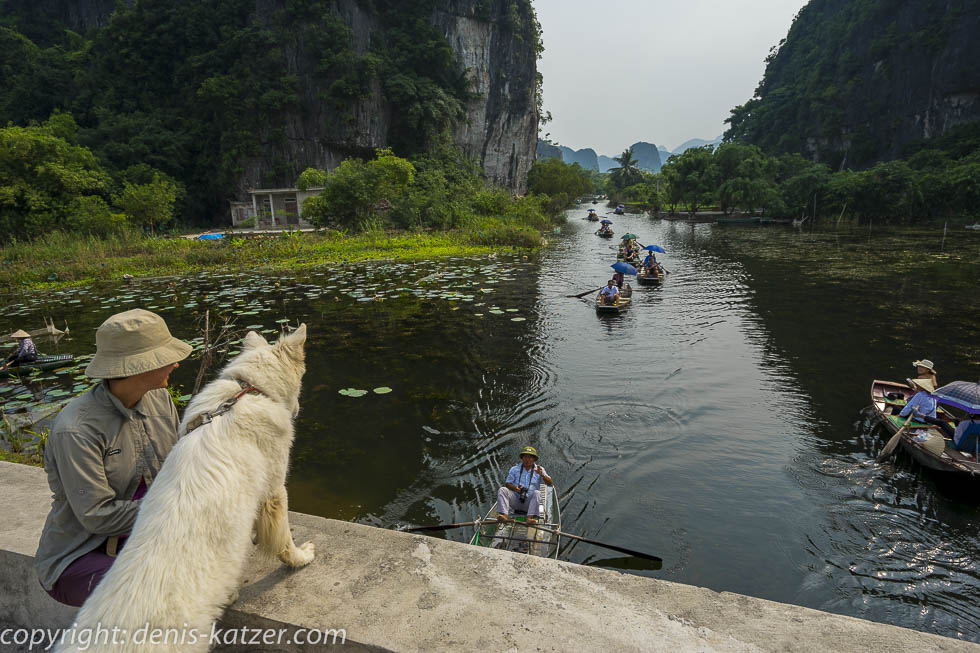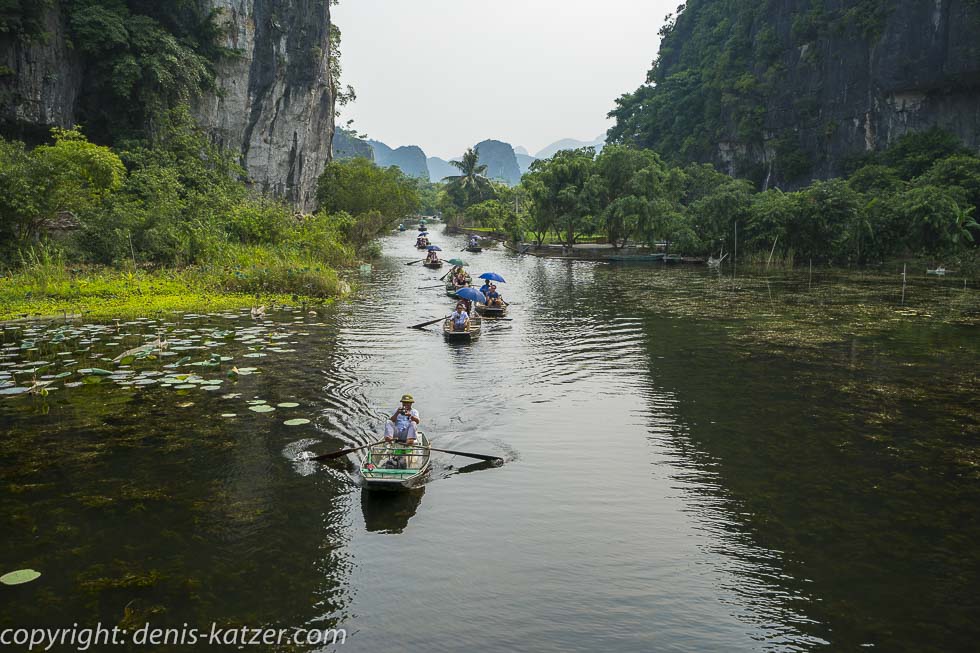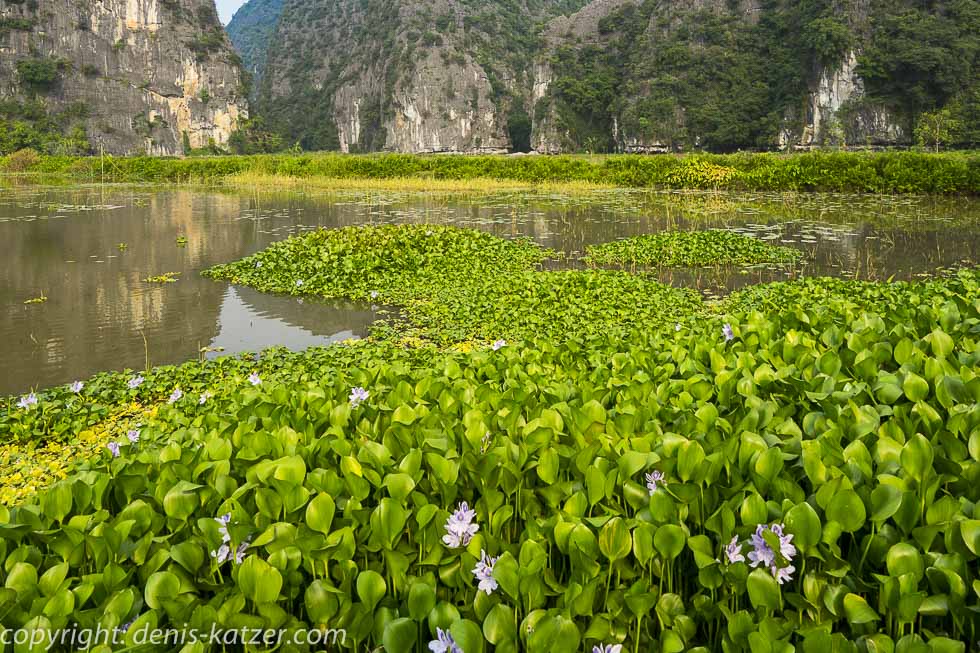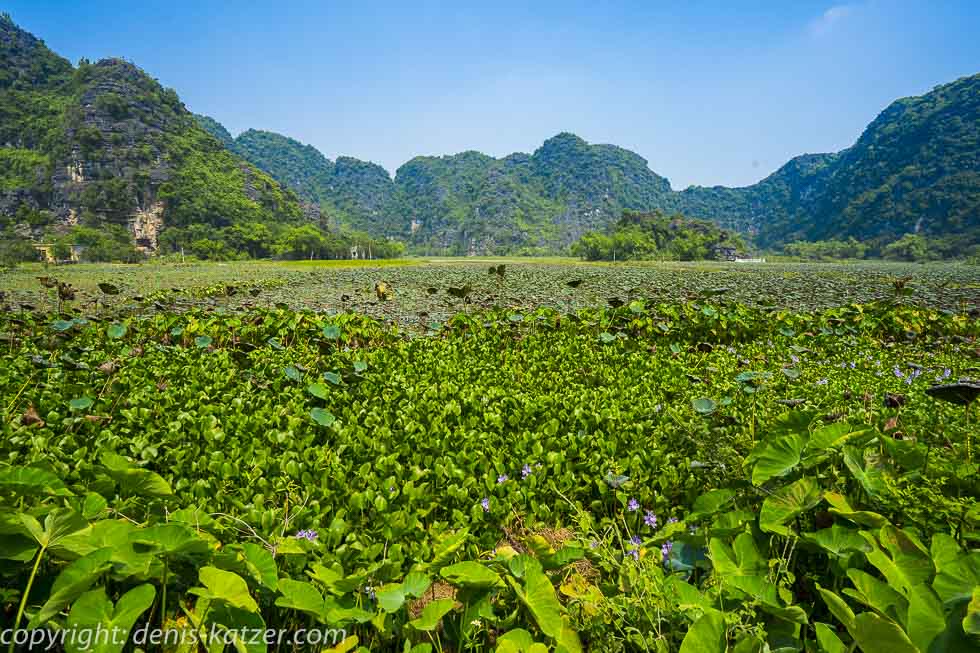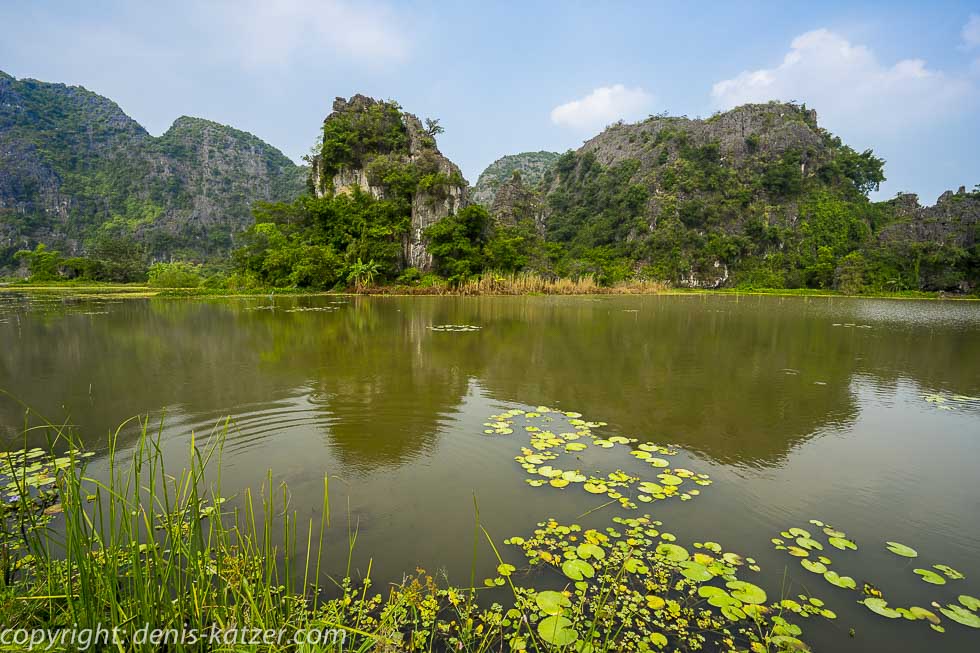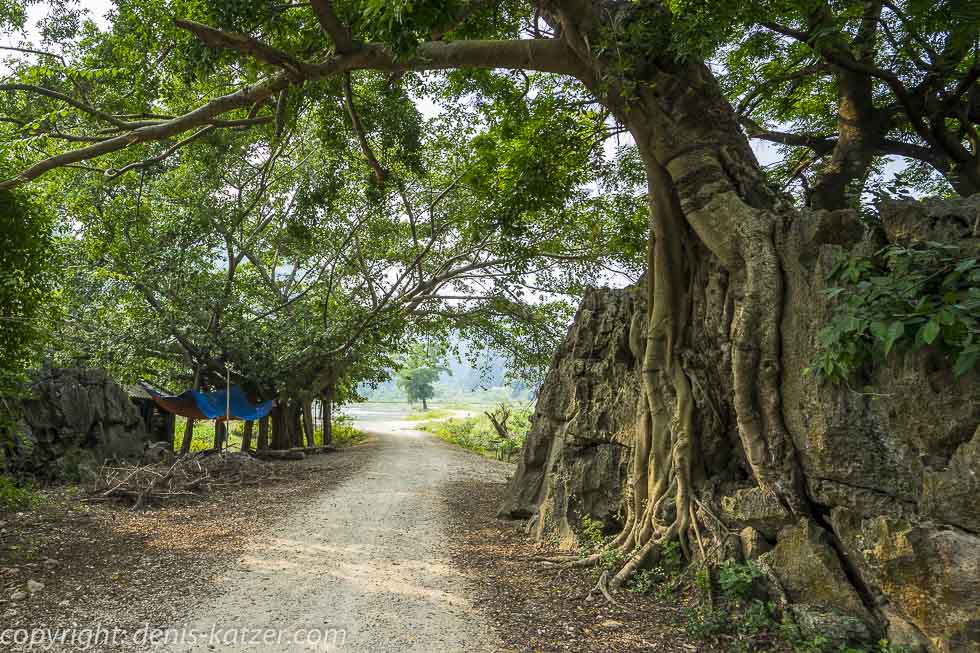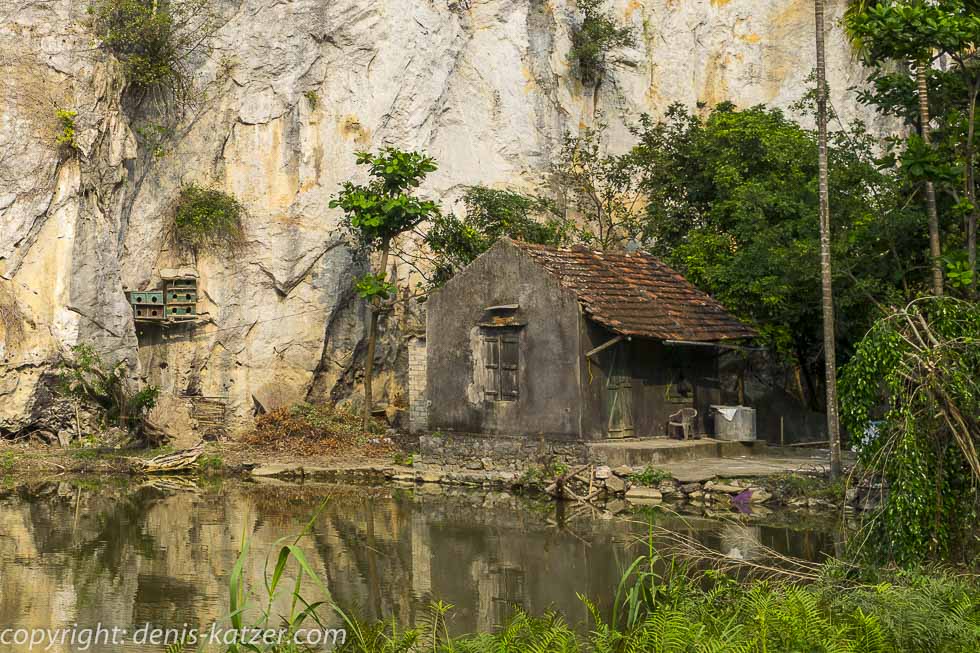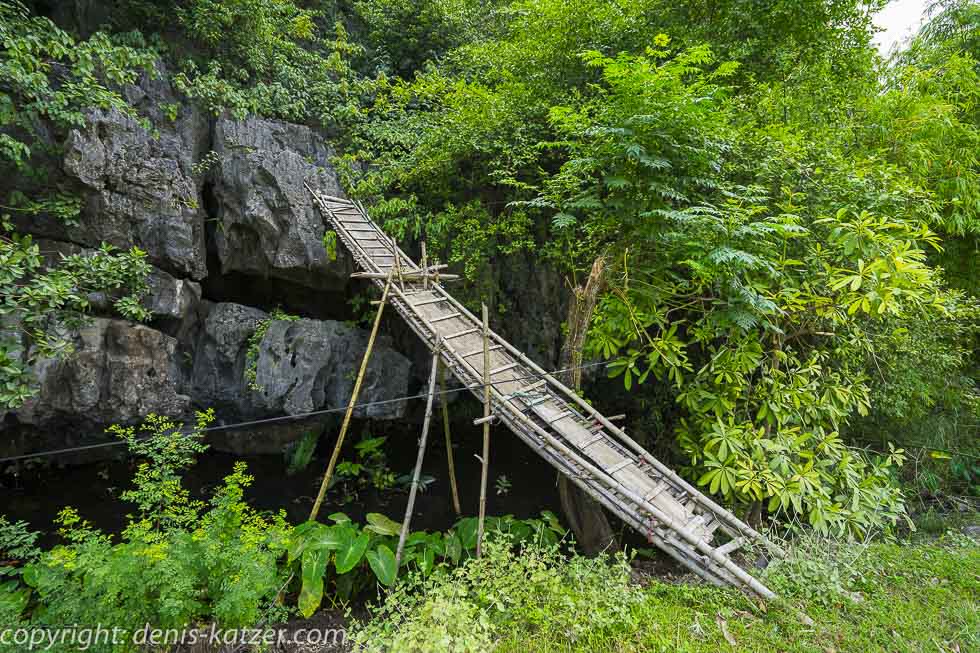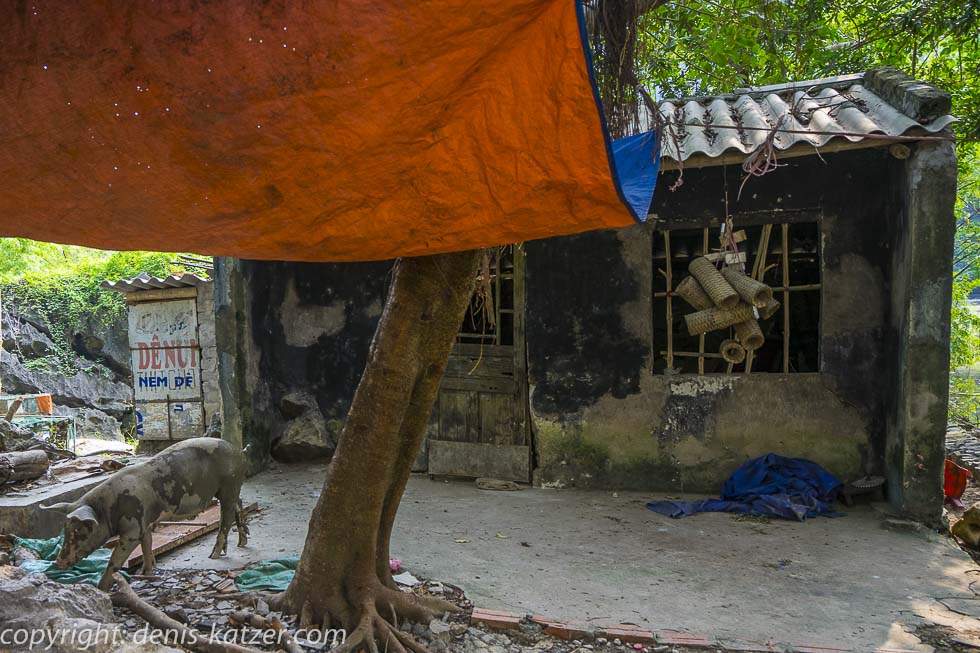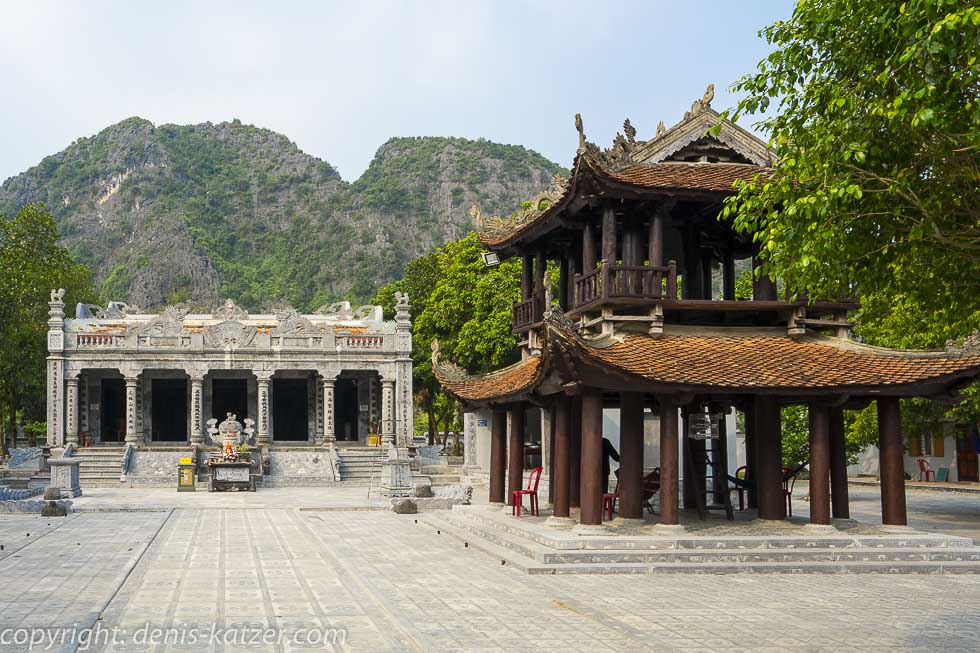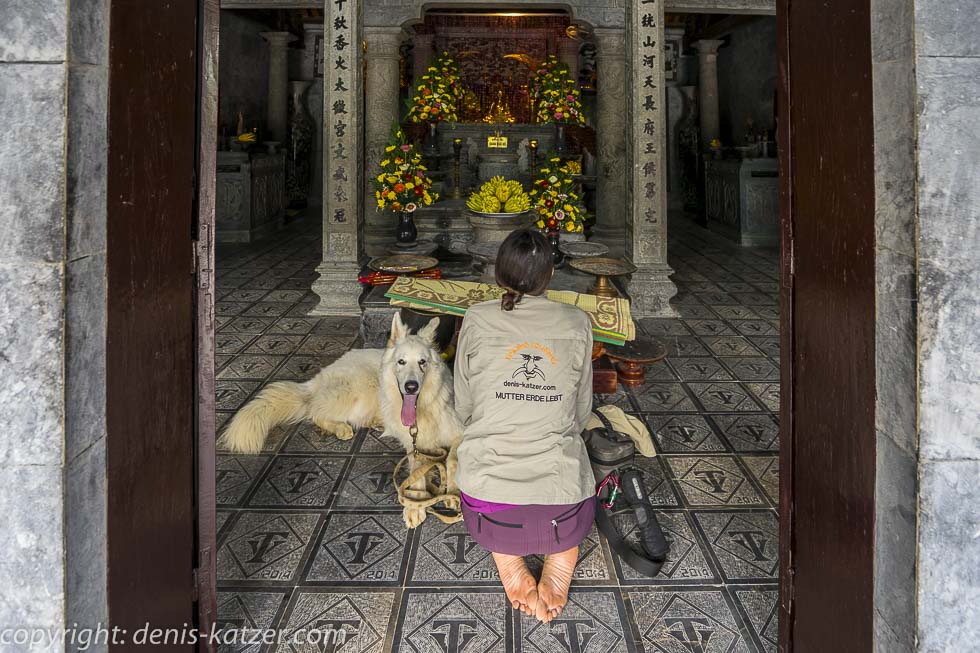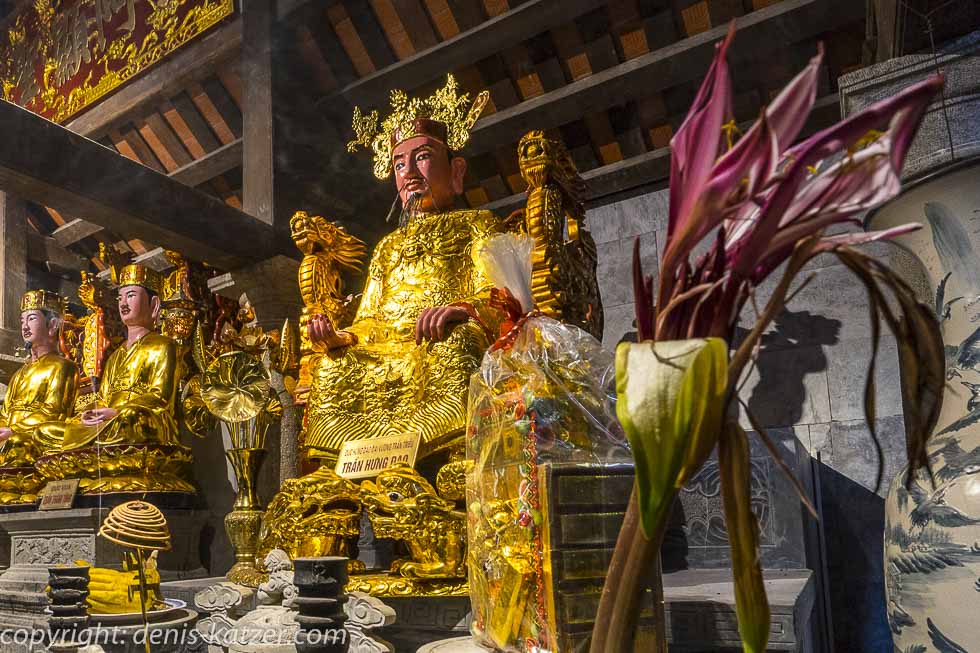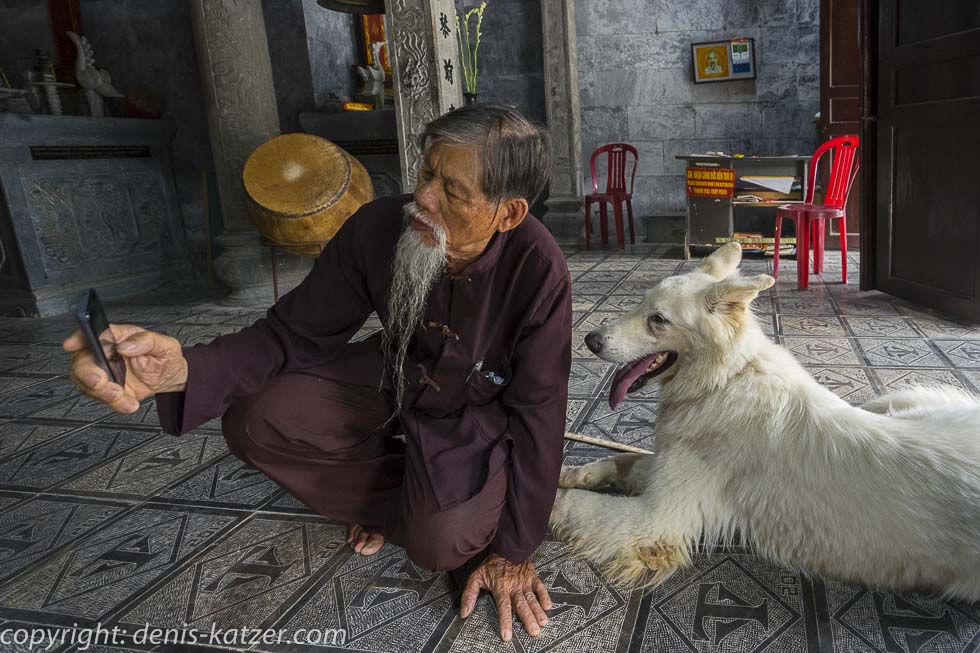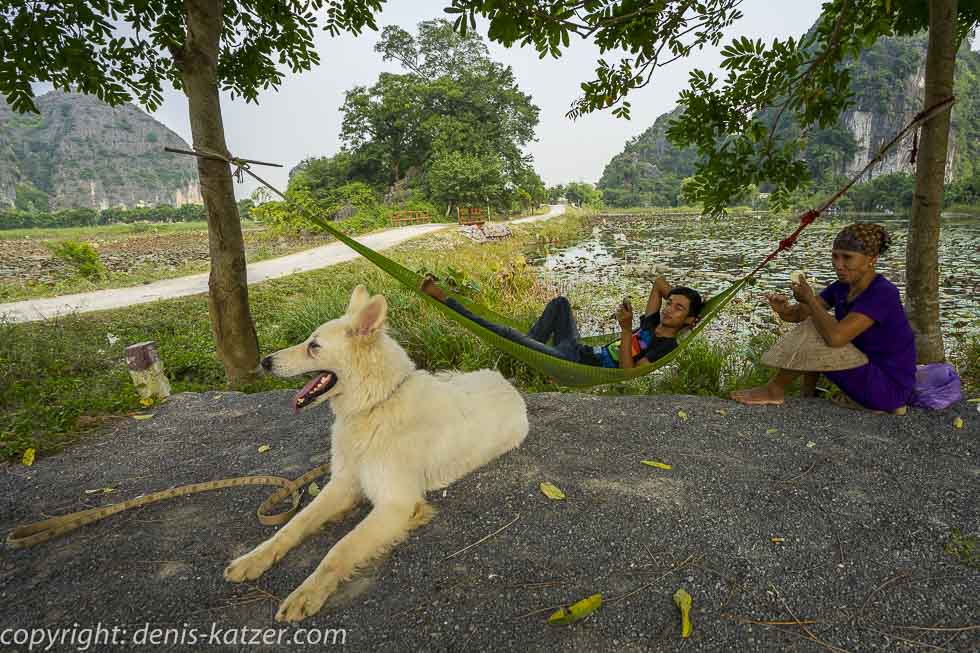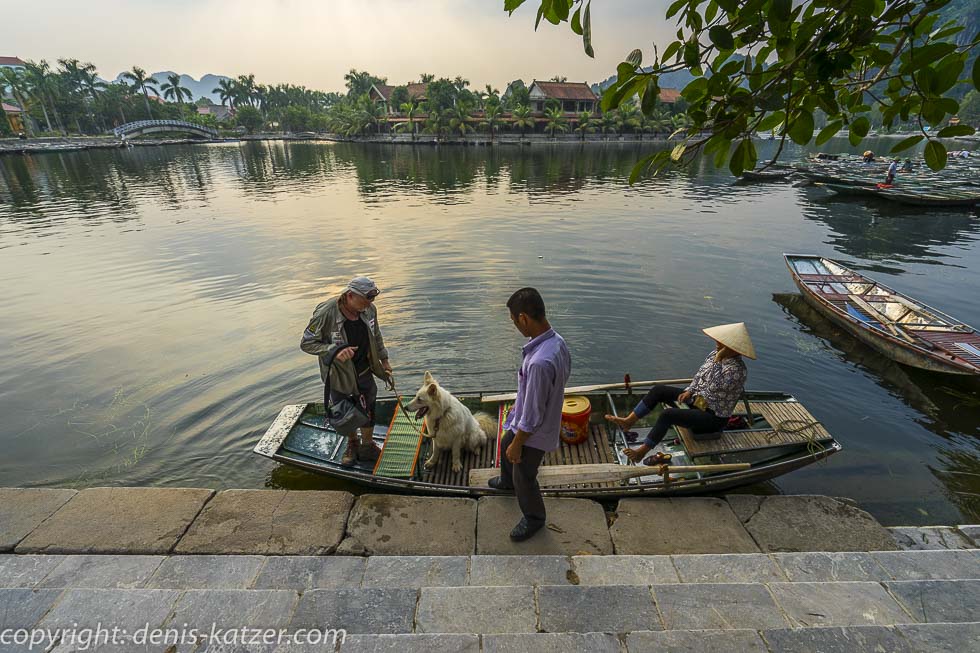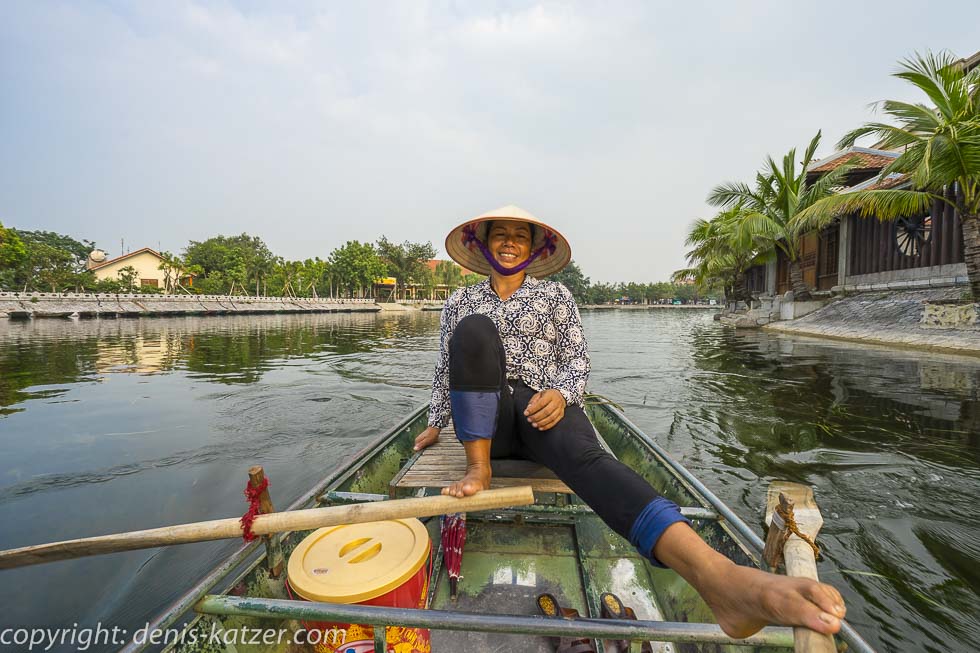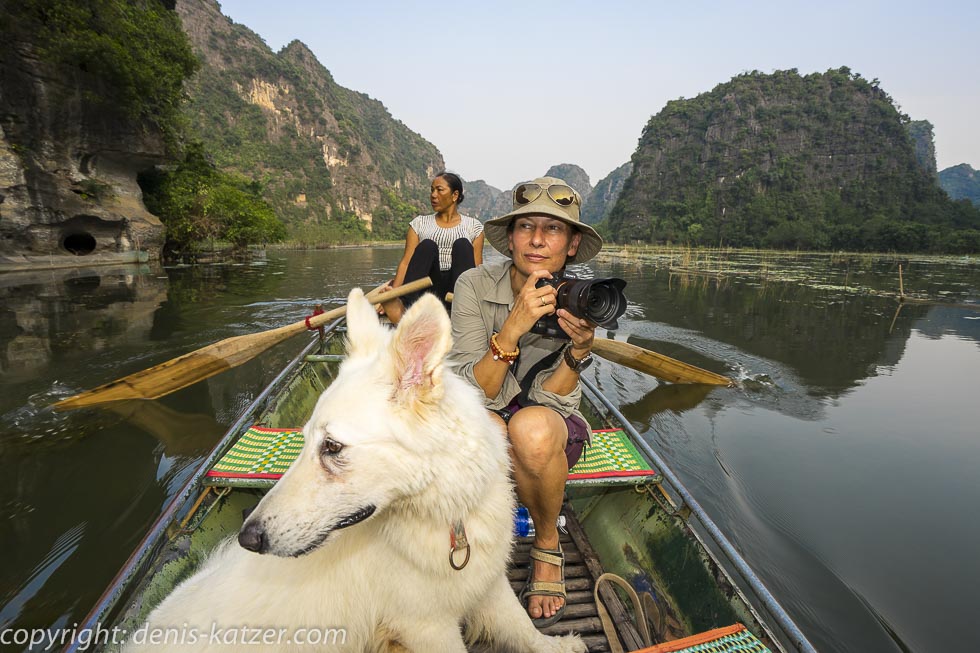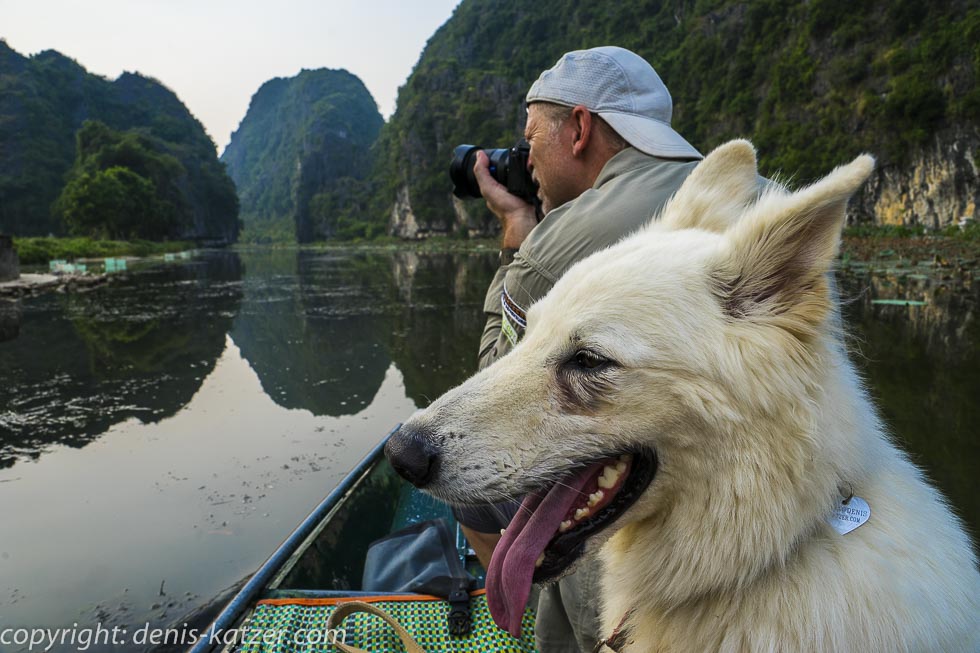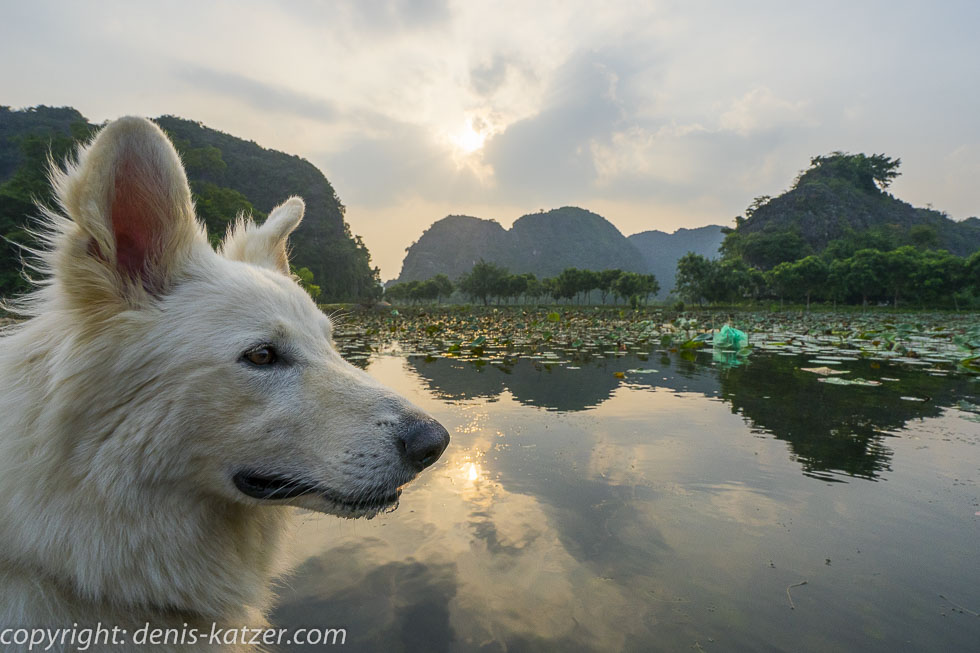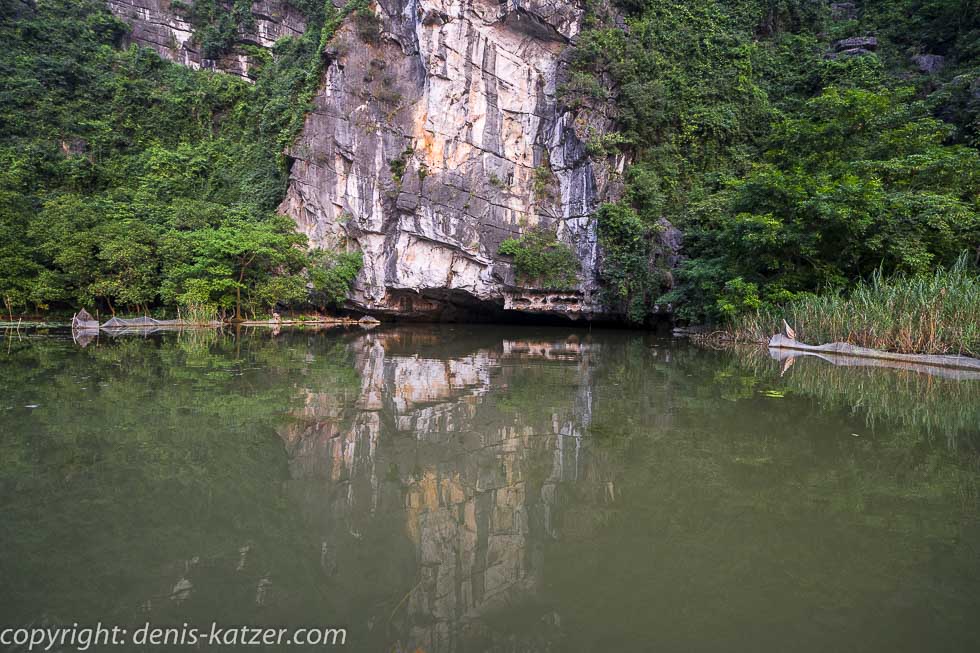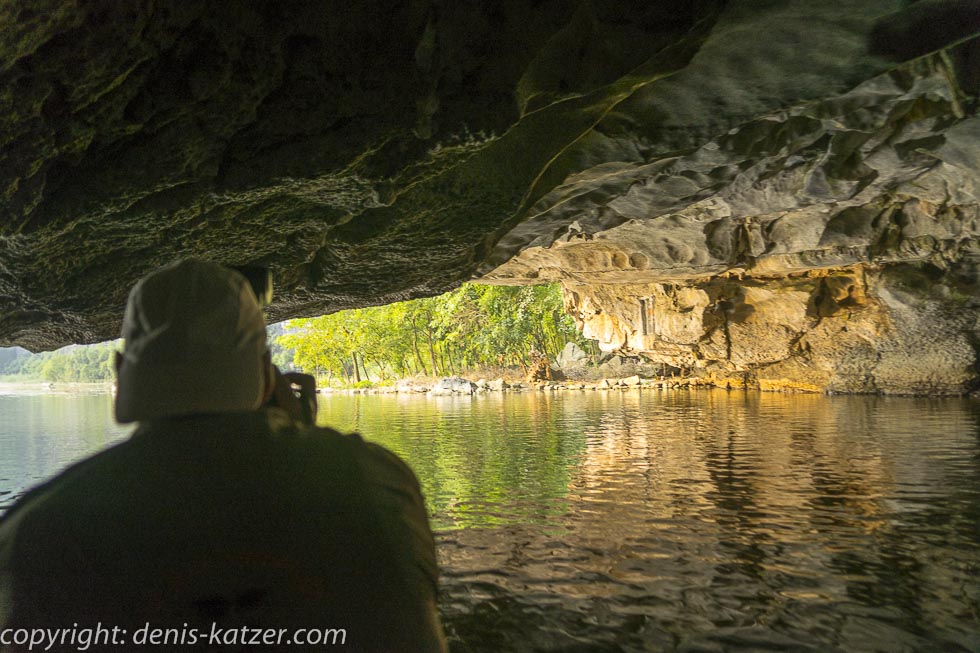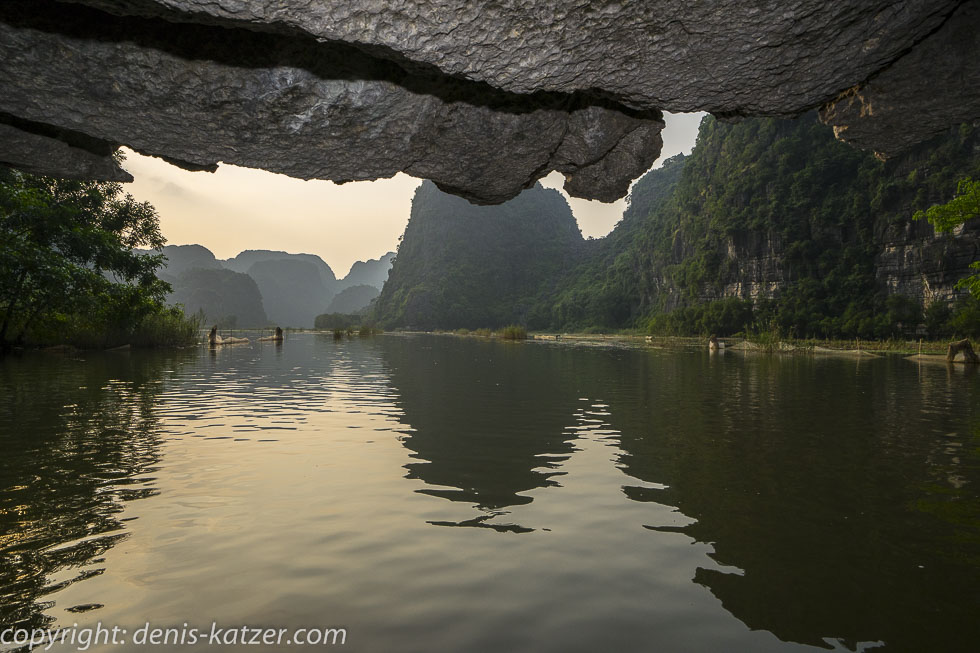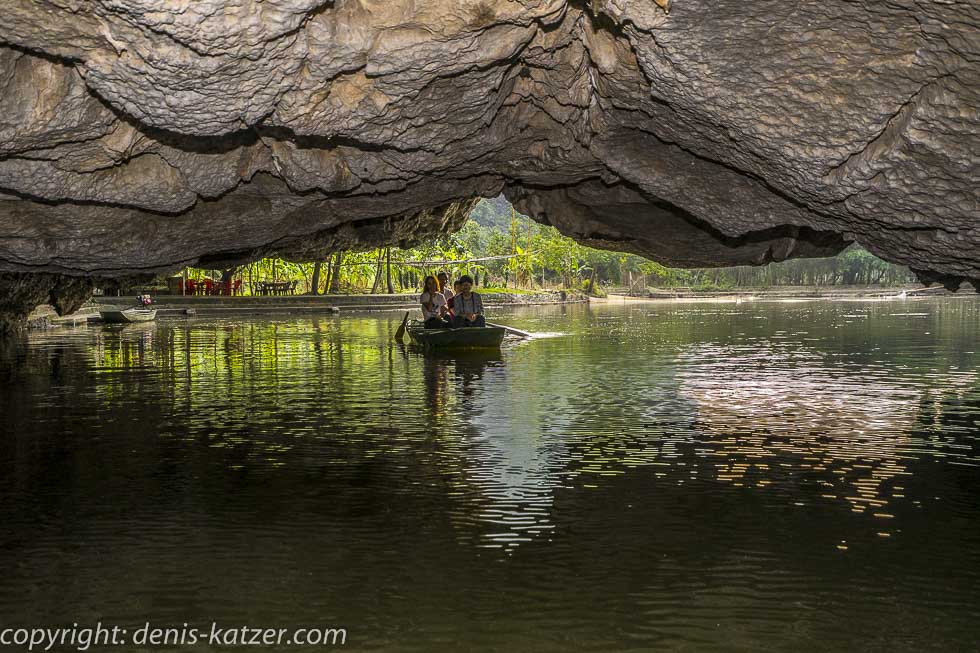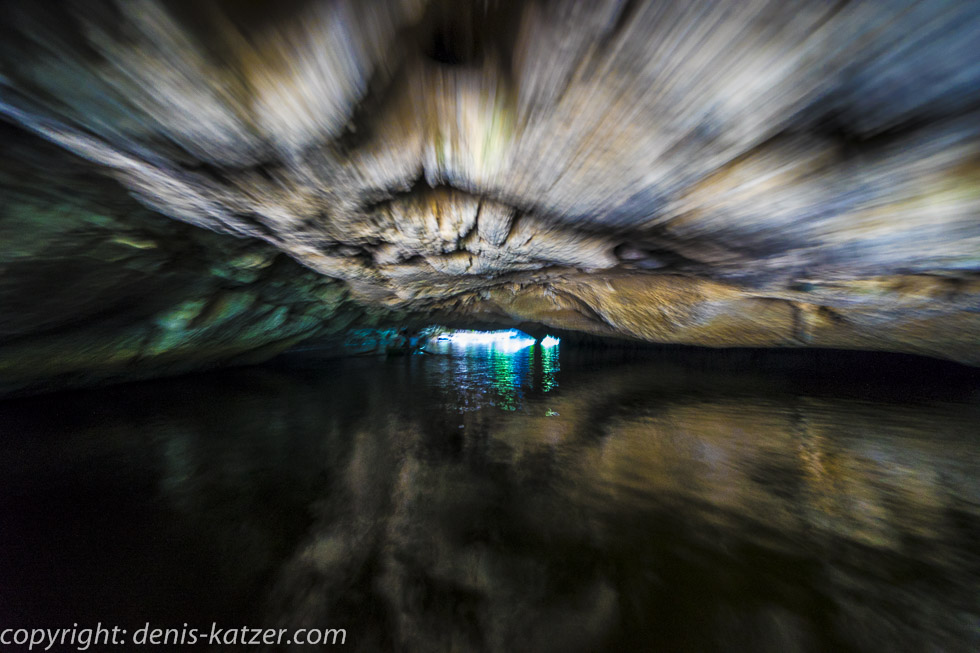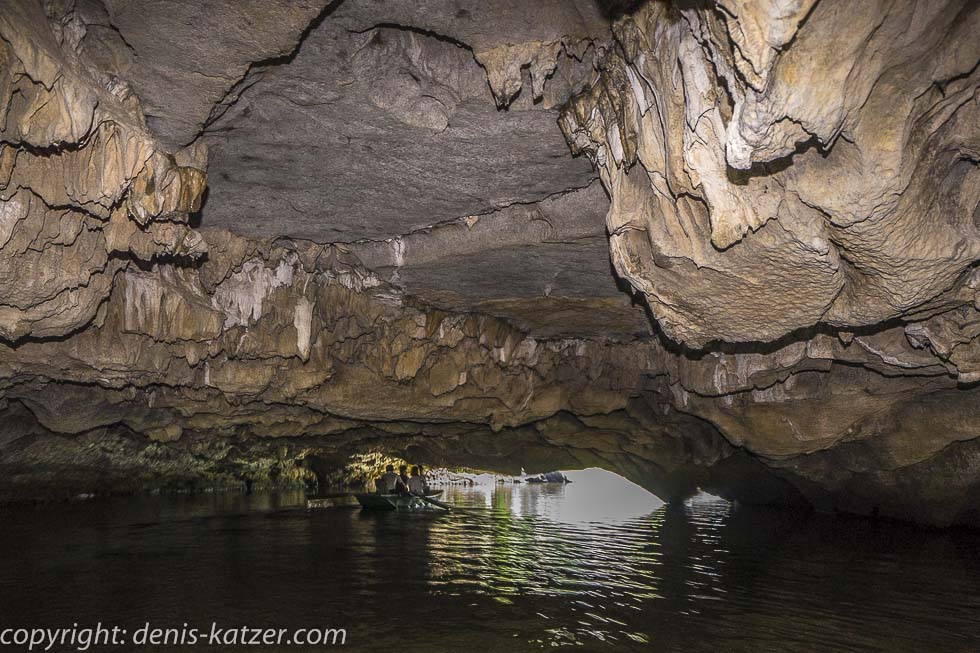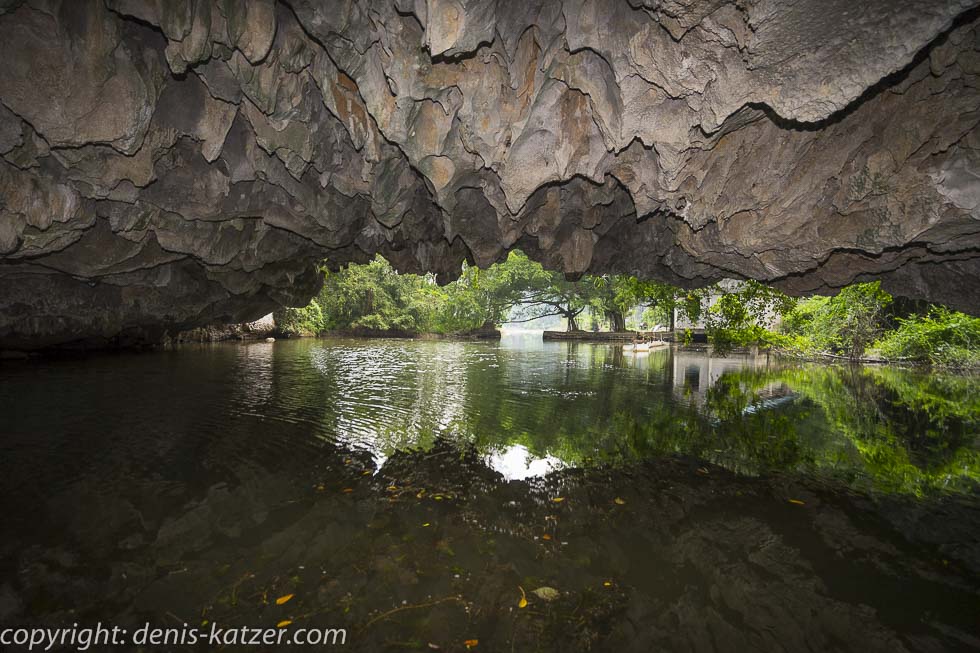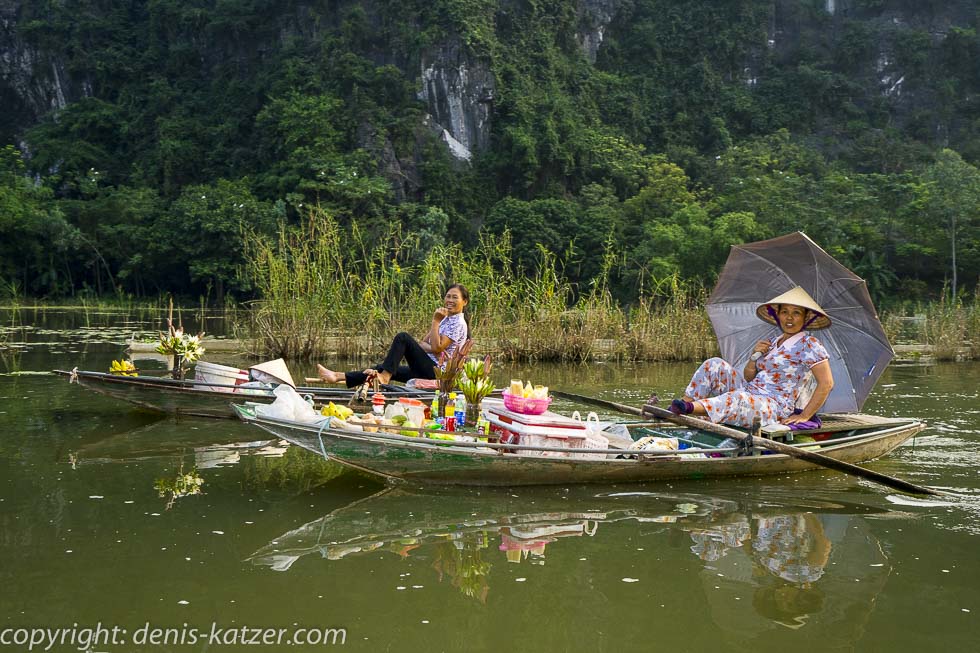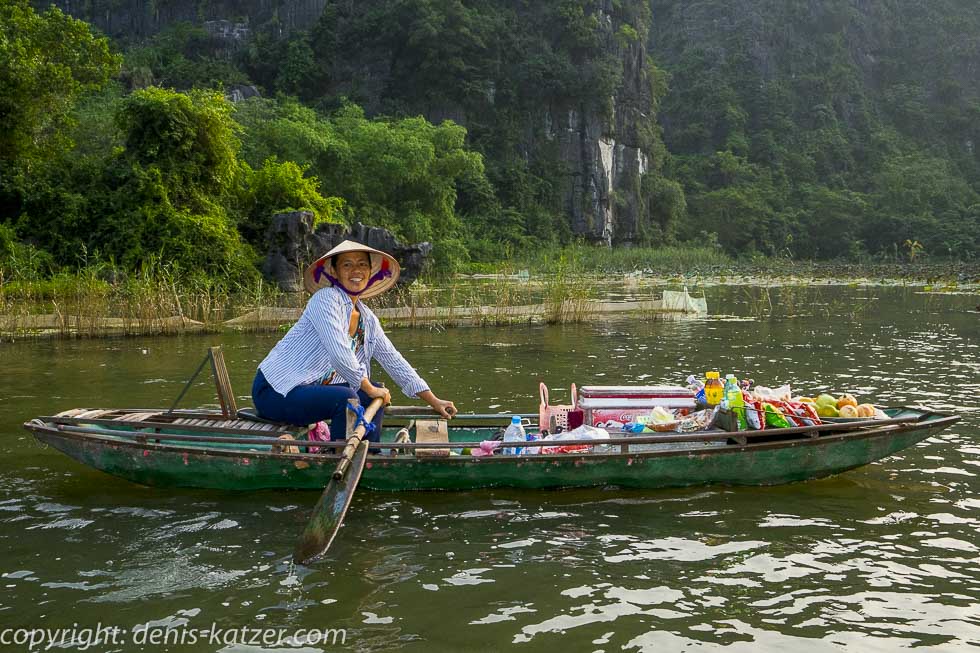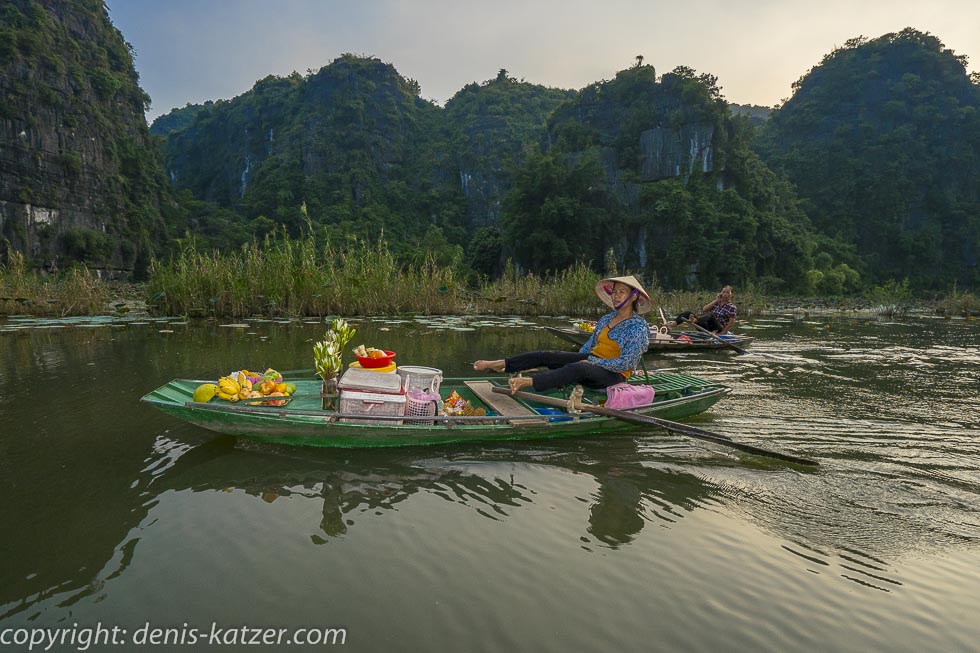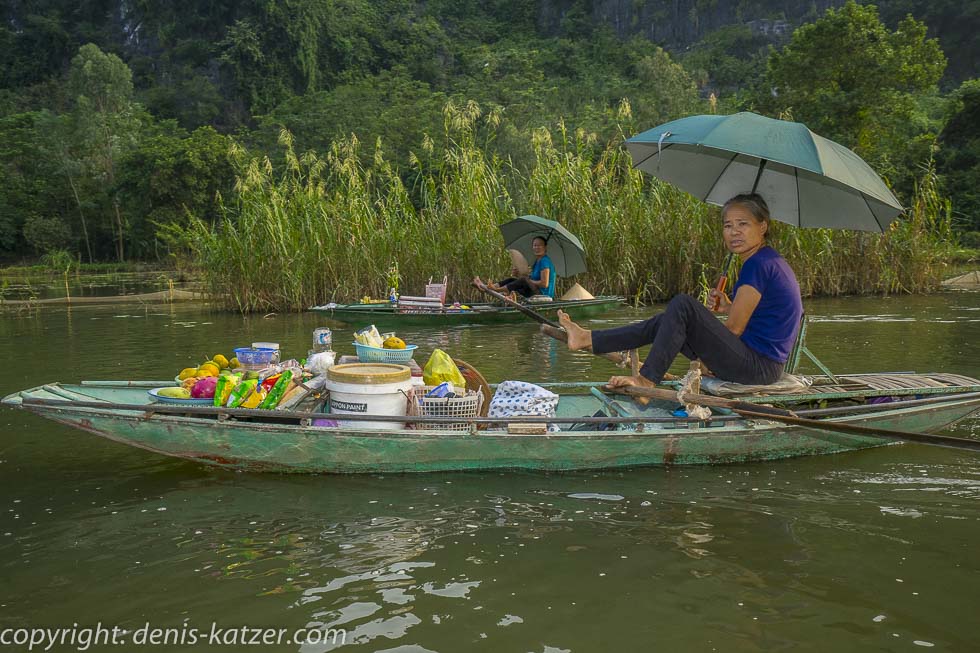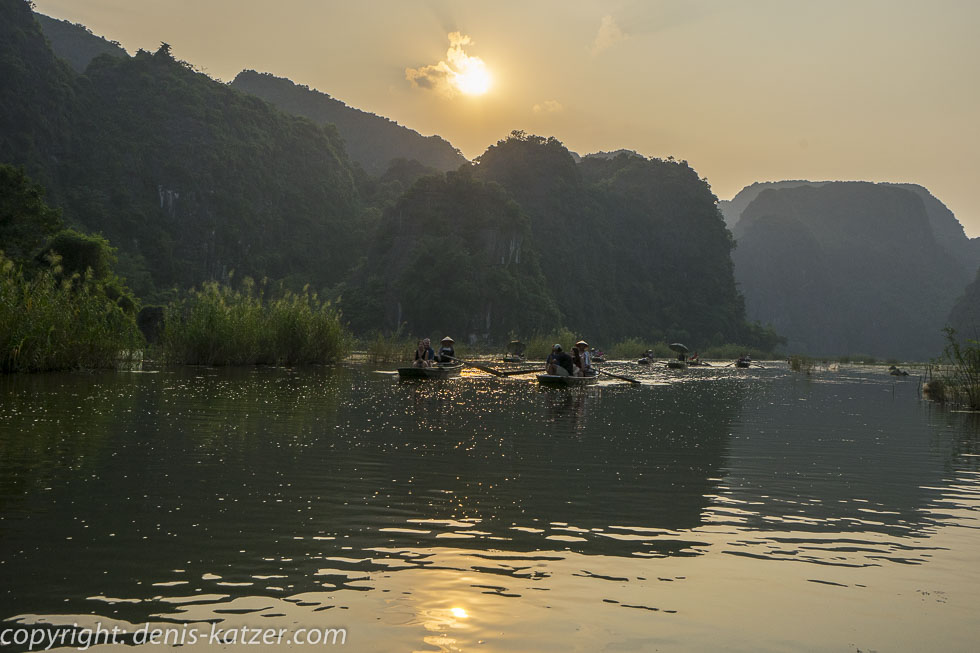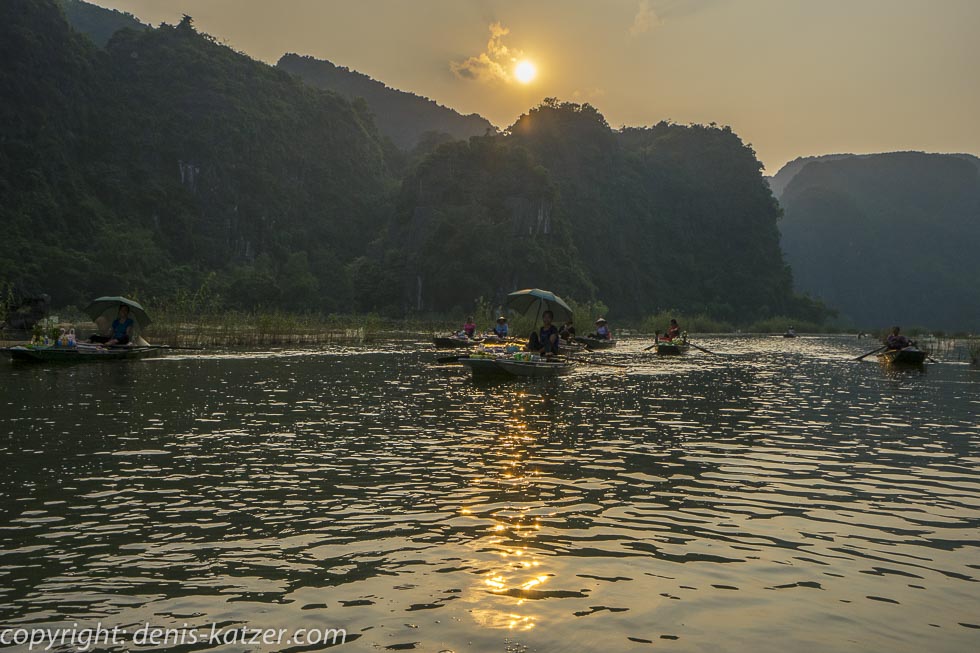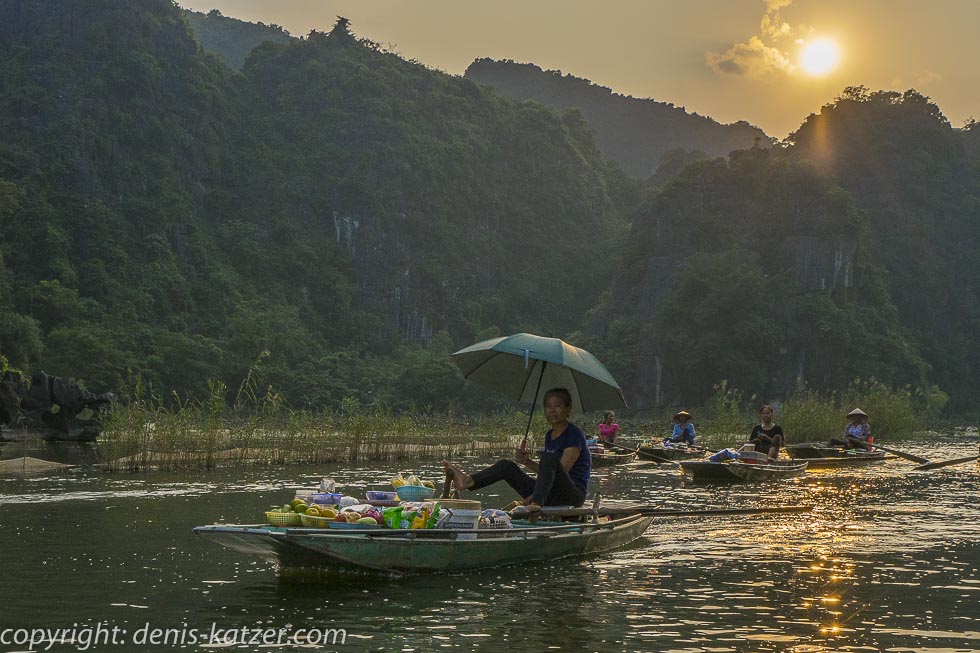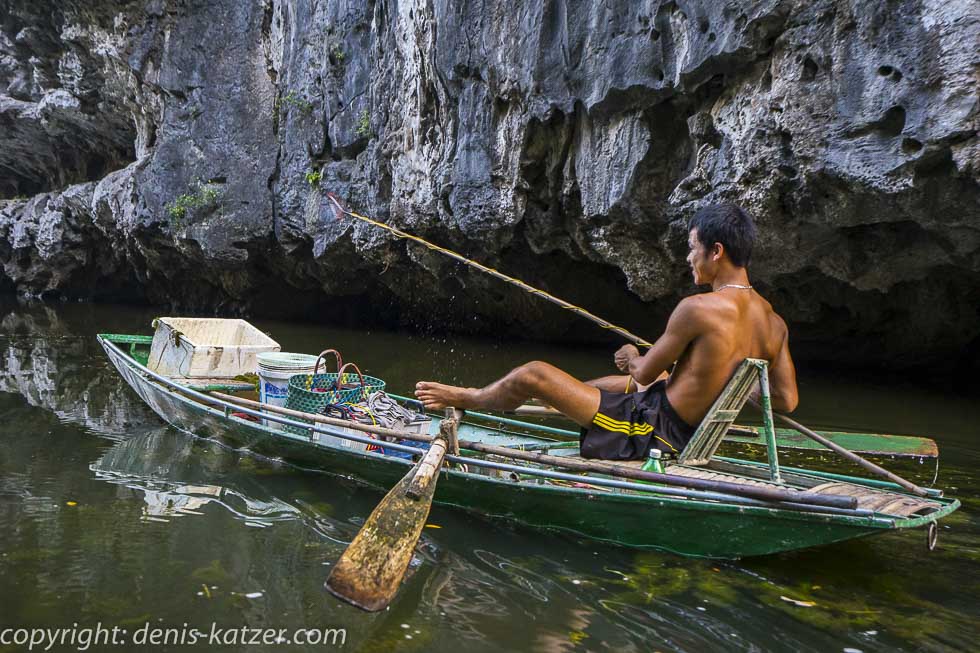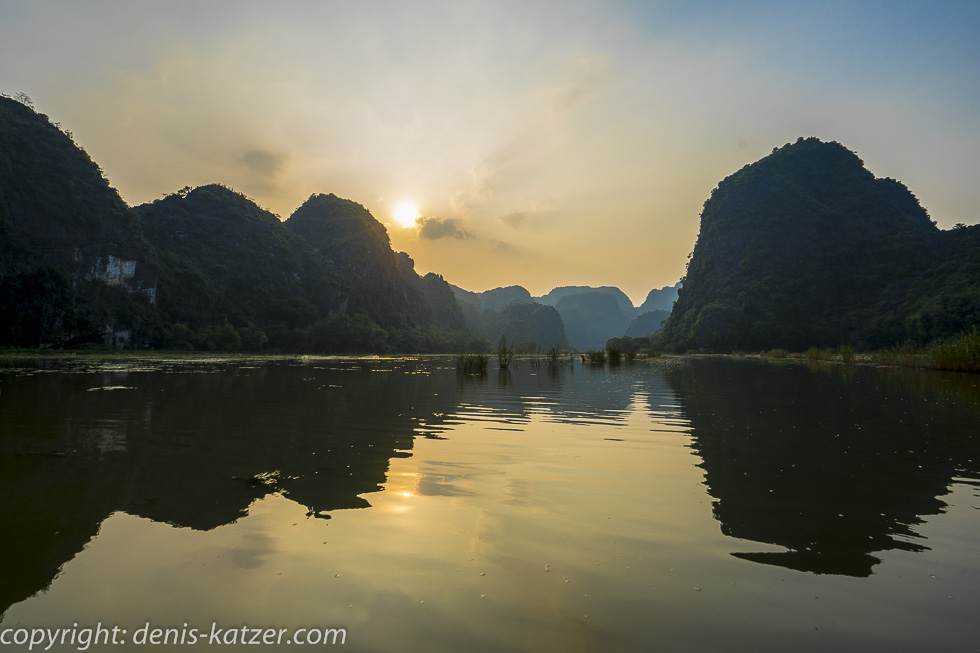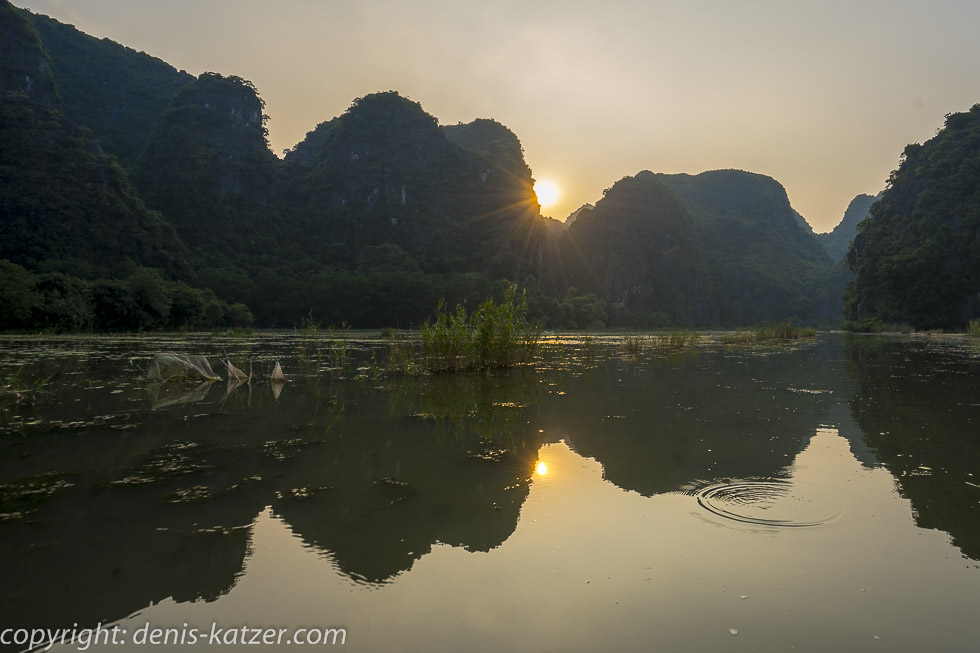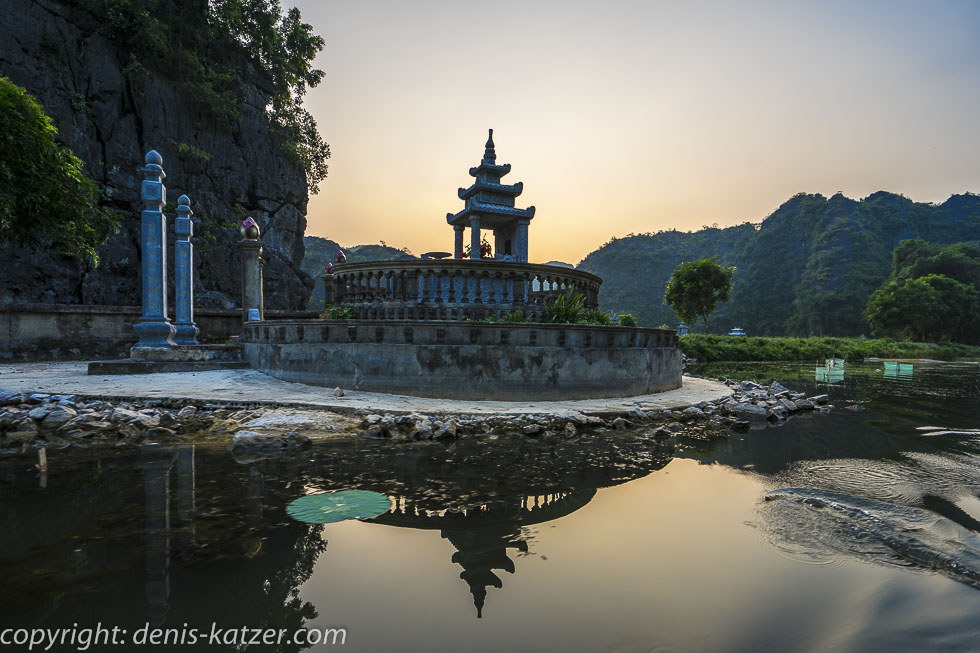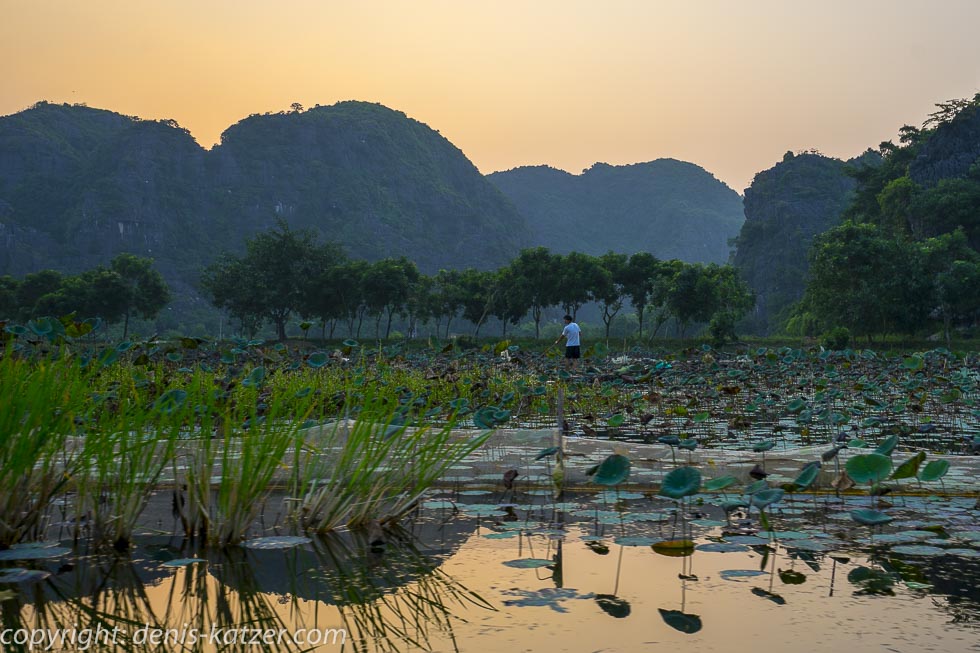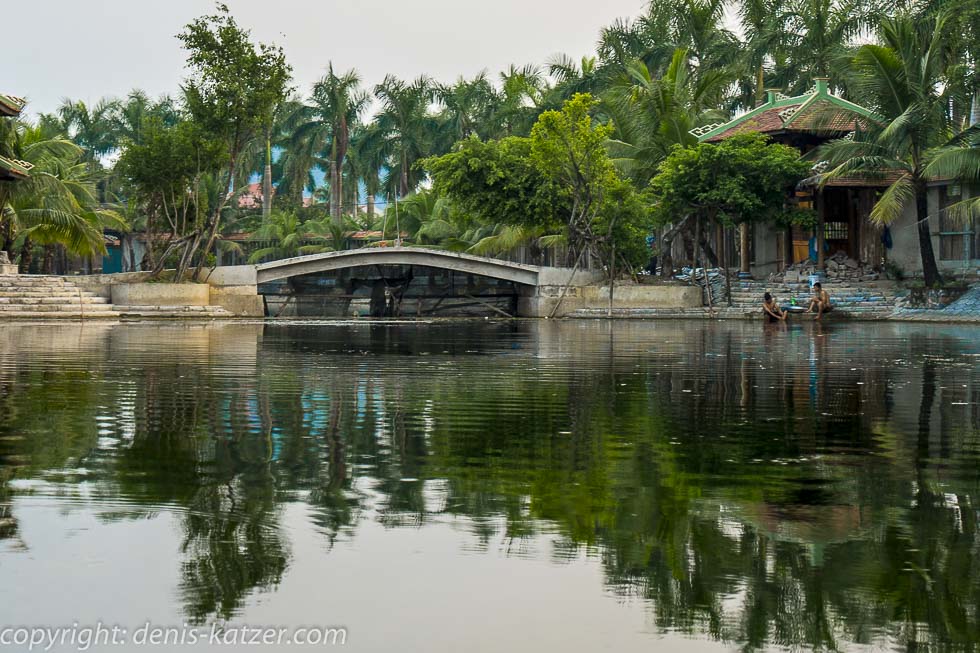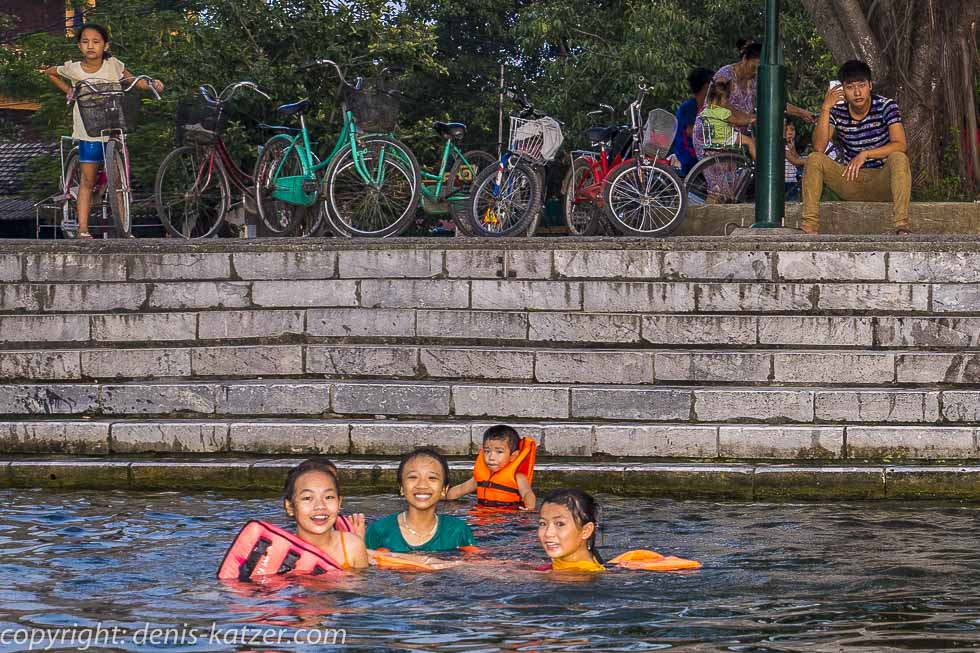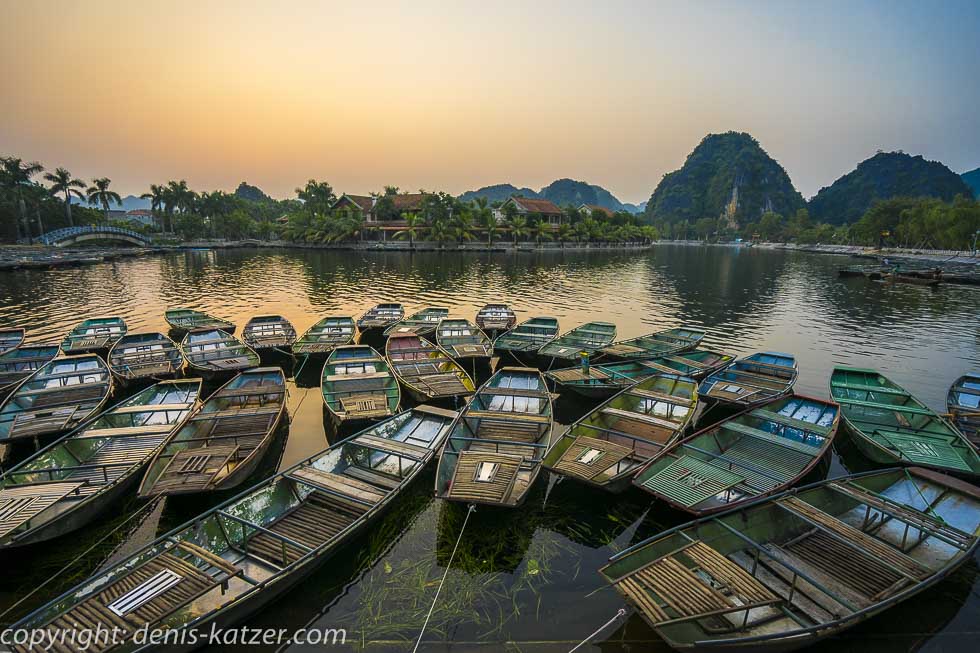
Tam Coc – creatures from the past – river caves under the karst mountains
N 20°13'00.0'' E 105°54'00.0''
Date:
07.10.2016
Day: 469
Country:
Vietnam
Province:
Ninh Bình
Location:
Ninh Binh
Latitude N:
20°13’00.0”
Longitude E:
105°54’00.0”
Daily kilometers:
145 km covered by car
Total kilometers:
19,326 km
Soil condition:
Asphalt
Total altitude meters:
54.661 m
Sunrise:
05:48
Sunset:
5:40 pm
Temperature day max:
38°C
Temperature day min:
24°C
(Photos of the diary entry can be found at the end of the text).
“Ajaci is certainly not allowed to travel on a normal bus,” was Ka’s startling reply when we asked him yesterday about a bus connection from Mai Chau to Ninh Binh. “What? He was already on the bus to Hanoi and Halong Bay,” I replied. “That was a tourist bus. That’s fine, but there are bound to be problems on a public bus.” “And how are we supposed to get to Ninh Binh then?” Tanja interjected. “Maybe Manh Do can drive you there?” his wife Moon, who was also sitting at reception because she is responsible for the resort’s tourist bookings, pondered. “You mean he would do that?” I felt a glimmer of hope that we could still realize our plan. “As far as I know, he has to go to Ninh Binh anyway. That shouldn’t be a problem.” I immediately called Manh Do. “Hi Manh. Where are you right now?” “In Hanoi, why?” “Moon says you’re going to Ninh Binh in the next few days and could take us with you?” “I actually wanted to leave directly from Hanoi to Ninh Binh today. Ninh Binh is only about 130 kilometers from here, but I would scrap my plan for you, come to Mai Chau first, pick you up and then drive to Ninh Binh tomorrow morning.” “That would be at least twice as far for you. Isn’t that too much to ask?” “I’d be happy to do it for you,” we were amazed by his enormous willingness to help.
The next morning, Manh Do actually picks us up from Mai Chau. “Hobby,” I order Ajaci to jump onto the loading area. “You’re lucky that your friend Manh likes you so much. It’ll make your trip more comfortable,” I explain to him, which is why he responds with an excited howl. “Ha, ha, ha, good boy,” Manh laughs and pats him affectionately.
Around midday we reach the picturesque landscape near Ninh Binh. “I have to pop in to see my friend,” explains Manh, as the four-wheeler bumps along narrow, sometimes unpaved paths that lead us through fairytale valleys. We park below some green, sugar loaf-shaped hills. “I’m building another resort here with a friend,” Manh explains, pointing to a few poor thatched huts.
It’s hot. We sit at a rickety wooden table. Vietnamese music croaks out of a small portable radio. A baby crawls on all fours on the floor and cries for its mom. An older man places two glasses of lemon water on the sticky table while Manh chats with some family members. His friend is not there at the moment, he learns. Manh takes it in his stride and laughs. The old man looks curiously at Ajaci and raises his fist with his thumb upwards, grinning. “How much does it weigh?” he asks. “35 kilograms,” answers Tanja. “Oh ho!” he shouts and laughs again. “And how do you like this place?” asks Manh. “Very beautiful. It’s really quiet here and the landscape is indescribably beautiful. But how are you going to attract tourists to this remote region?” “No problem. We offer them accommodation, good food, bike and boat tours. The whole program. That’s what Moon will sell to tourists in our new travel agency in Hanoi.” “Yes, that will definitely work,” I say confidently, as Manh has already built up the resort in Mai Chau, where a few years ago there was nothing but rice fields and poor farming villages.
Then Manh takes us to a small family hotel with simple rooms not far from the Ngo-Dong River. “Here, for you,” I say and hand over some money for his gas. “Basically, I don’t want any money from you.” “Manh, you picked us up from Mai Chau especially. It’s a contribution to your fuel costs.” “That’s too much.” “It’s absolutely fine,” I say, and embrace his shoulder amicably.
We carry the little luggage we have into the room and set off to visit a nearby temple. We sit down on a narrow arched bridge on the boundary wall. Numerous small rowing boats, each loaded with four tourists from all over the world, glide beneath us. Whenever people see Ajaci panting down at them with his mouth open and his tongue hanging out, they raise their cameras to take pictures of our superstar. “If you look like our dog, the doors of the world are open to you,” I realize, not for the first time. We enjoy our hike along small ponds overgrown with water lilies. A boy is dozing in his hammock in the shade of some trees. His mother crouches silently next to him and smiles at us. “Sit with us in the shade,” the old woman offers and wants to give Ajaci some of her sweet potato, which she is currently nibbling on. We sit down with them for a few minutes and gaze at one of the ponds brooding in the sun in collective, pleasant silence. Then we scramble up again and say goodbye to continue our little excursion. We pass half-ruined old houses and huts bathed in the glare of the sun. A pig runs across the path grunting loudly, not caring about the presence of our big dog. A narrow bridge made of coarse bamboo canes stretches across a pond. It leads steeply upwards into the jungle overgrown with sharp-edged rocks. Only an acrobat, or people who have done nothing else all their lives, dare to climb the rickety frame. Venerable trees spread their shady green branches across the path. Centuries-old roots, as thick as elephants’ feet, sprawl over archaic walls. If they could speak, they would certainly be able to tell us many stories about the events of the past centuries. “Where is the Thai Vi temple?” asks Tanja. “We should have reached him by now,” I moan under the sultry heat. The House of the Gods, built in the first half of the 14th century, appears around a bend. There are no visitors on the site apart from us. “Strange,” says Tanja. “It’s probably because of the merciless midday sun.” The only drinks vendor offers us water and soft drinks at inflated prices. We walk towards the main building between two small artificial ponds with wilted lotus flowers floating on the surface of the water. “Is ajaci allowed in the temple?” I wonder as we walk up the few steps. A creature from a bygone era approaches us. “He looks like the twin brother of Hồ Chí Minh”, (Prime Minister (1945-1955) and President (1945-1969) of the Democratic Republic of Vietnam), I murmur, because he has the same now out-of-fashion goatee as the former great statesman. Without saying a word, he takes Ajaci’s dog leash from Tanja’s hand and leads our dog into the temple. Puzzled, Tanja runs after him and grabs the leash again. “Strange man,” she says, kneeling down in front of the golden Buddha statues to meditate for a few minutes. I drop to my knees next to my wife and follow her example. For us, this is a ritual that we celebrate in almost every Buddhist temple we visit during our travels. Hồ Chí Minh’s twin brother, in his purple robe, watches us attentively. “Is he the guardian of the temple?” I ask myself. Then he kneels down next to Ajaci and pulls out his smartphone to take a few selfies. We say goodbye to the man and step back out into the merciless heat.
We don’t even have to ask if Ajaci is allowed on the small rowing boat. As soon as the woman moors her boat, he jumps onto the wobbly thing. In the meantime, he has already gained some experience on junks in Halong Bay and has been looking forward to every new boat trip ever since. “Should have been a seal,” I joke and follow our dog onto the rocking Khan. It is already 4 p.m. and because most tourists have already finished their boat tour by this time, it is a very good time to explore Tam Coc, which translates as “three caves”, on the Ngo Dong River. “Huuuhuuu!” howls Ajaci as the rower laughs and moves the oars not with her hands but with her feet. Numerous tourist cameras follow what is probably the only opportunity in Vietnam’s history to immortalize a white shepherd dog on a rowing boat with their cameras. Some of the spectators even clap their hands as we leave the rowing boat harbor with a loud howl from the four-legged friend. It doesn’t take long before we are gliding through a fairytale world for which there are hardly any words to describe it. High, rugged limestone cliffs line the shore, which is lined with lush rice fields. The hills and mountain peaks, with their idiosyncratic shapes and formations, prompted the inhabitants of this region to give them a wide variety of names. One that looks like a turtle is called Kim Quy, which translates as golden turtle. As the sun has long since disappeared behind the mighty-looking mountains, its long, powerful shadows fall on the smooth surface of the river. We sit silently in our tin nutshell and enjoy the idiosyncratic and varied beauty of our planet. “There’s the first cave up ahead,” I say, pointing to a slit just above the surface of the water. A massive rock face towers mightily above our heads as we disappear beneath it. The lack of draught makes it instantly oppressive and extremely humid. As if you could grasp the air, it billows around our bodies. Dripping stalactites hang from the rock ceiling gliding close above our heads. Splash, splash, splash, all you can hear is the dipping of the rudder blades. Muffled sounds echo back from the walls. Some of the rock formations resemble floating clouds. “We call some of the stalactites from which the water drips mother breasts,” the rower explains to us in broken English. After 127 meters, the hot and humid steam boiler cave called Ca releases us again. A bat flutters towards us and seeks shelter in the dark interior of the river cave behind us. „Wow“, staune ich immer wieder, während Ajaci mit einem Huuuuhuuuu, und die Ruderin mit einem heiteren Lachen die idyllische Ruhe dieser mystischen Welt für Augenblicke vertreiben. Splash, splash, splash. Some rowers come towards us with their floating stores. As there are hardly any tourists out and about at this hour, the working day on the Ngo Dong River is over for them. Their husbands and children are waiting at home for whom they have to prepare dinner. “Hello! Hello! Hello!” some of them call out to us. When they discover Ajaci, the excitement is great. Words of explanation change quickly from boat to boat. “A beautiful dog!” one of them calls out to us in broken English. It is getting quieter and quieter on the Ngo Dong. Fascinated, I gaze into the calm, mostly clear water. Fish chase between the waving lime-green water plants. They seem to be enjoying the approaching calm as darkness falls. White birds stalk through the rice fields near the shore. We cross two more caves. Arched remains in the rock bear witness to the former presence of the sea and attract our attention. “A crazy world,” I marvel. On the way back, we glide silently under an arched bridge. The first houses appear. An interesting-looking couple is sitting on a staircase right by the water. Our eyes meet. “A nice place to rest!” I shout. “Beautiful!” is the friendly reply. “We should stop by on our way back to our accommodation. Maybe they still have a bungalow available?” I suggest to Tanja.
Then, after more than two hours, we are the last rowing boat to take us to the jetty. The sky has taken on a pale pink color and is reflected on the dark surface of the river. Children splash around happily in the warm water of the Ngo-Dong. When they spot the white wolf, they squeak over to us. “Huuuuhuuu!” howls Ajaci in reply…
If you would like to find out more about our adventures, you can find our books under this link.
The live coverage is supported by the companies Gesat GmbH: www.gesat.com and roda computer GmbH http://roda-computer.com/ The satellite telephone Explorer 300 from Gesat and the rugged notebook Pegasus RP9 from Roda are the pillars of the transmission. Pegasus RP9 from Roda are the pillars of the transmission.
